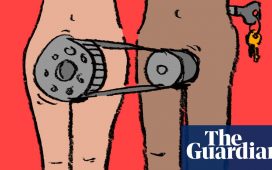On Friday night my wife, Lisa, and I watched the three episodes of 63 Up while my youngest daughter and her friend, in a respite from the brutal slog of GCSEs, caught up with a week of Love Island upstairs. Those of us who like to feel as if we have grown up with Michael Apted’s series – I was born the year after the first film, Seven Up!, was broadcast in 1964 – might be tempted to see some kind of tale for our times in that juxtaposition. There probably isn’t one, except to hope that some smart producer, with an eye on longevity, has signed up the love islanders for return visits in 2026 and 2033 and 2040, so we can observe the effect of time and mortgage interest and sleepless parenting on their muscle tone and wayward eyes.
Each of the Up films has had its own emotional register. The Love Island equivalent, 21 Up, had a bit of shaggy haired, high-waistbanded 1977 excitement about the lottery of girl meets boy. Jackie and Lynn, two of the original friends from the East End primary school in the series, were already married by then. Tony, the artful dodger with aspirations to become a jockey, had met his future wife, Debbie, at a disco, and Paul, one of the boys from the care home, had moved to Australia and found his soulmate, Susan. Forty-two years on, this time around, two of those bonds – Paul’s and Tony’s – had endured, despite everything. Jackie has been divorced, married again, divorced, while librarian Lynn’s rock-solid marriage to Russ had ended with her sudden death in 2013.
Apted, the director, himself now 78, had wondered a few times in interviews what would happen when mortality finally invaded the fated group of children he had helped to choose all those years ago. In the event, he approached the fact with all his familiar frank empathy; Russ and his two daughters spoke about Lynn’s death to Apted’s camera with an honesty that did her proud. Hers was not the only shadow among the interviewees, either. Nick, who left his father’s Dales farm to become a nuclear physicist, had always been the strongest life force in the group. Here, he was now diminished and sipping water, suffering with throat cancer at his home in Wisconsin. Did he fear what might be to come? Apted asked. “Not for myself,” Nick said, with those doubly blunt Yorkshire scientist’s vowels, “but a bit for those who would be left behind.”
He was talking about his second wife and his son, but he might also have included the rest of us watching at home. We have come to care so much about these strangers because they share our own hopes and fears. Apted’s film – it makes sense to view the whole 55 years as a single entity – does the magic that great 19th-century novels once achieved, of making us grasp that seemingly impossible truth that every person around us has an interior life every bit as vivid as our own.

The unspooling exposure of that universal fact was not the original intention of Seven Up!. It was made as a one-off film by the angry young men at Granada TV and World in Action to reveal how class division persisted in England, despite the revolutionary liberties promised by the Beatles and the 1960s.
The first films achieved that aim, demonstrating with tragic acuity how access and expectation dictated opportunity; how the prep school boys knew at seven exactly their path to boarding school and Oxford and the Bar, and duly followed it, and how the East End children saw life choices they barely understood only narrow before their eyes.
As the series has gone on, however, that politics has been supplanted by a different kind of wisdom. The primary question as its subjects have aged has become not what makes them successful, but what makes them happy. We are, at 63, approaching something like a reckoning in that regard and, stripping away wealth and privilege like some medieval morality play, where you started out from does not seem half as important as how you are ending up.
A couple of truths emerge. The Ignatius Loyola quote that was the film’s starting point – “Give me the child until seven and I will show you the man” – wants to prove the bias of early nurture on our lives. In many ways, the opposite has been revealed. While all psychological theory agrees that severe emotional deprivation has profound implications for personality, within “normal” environments, our most fundamental selves appear impervious to anything life throws at us.
As the esteemed child psychologist Alison Gopnik recently argued: “It is very difficult to find any reliable, empirical relation between the small variations in what parents do and the resulting adult traits of their children.” We instinctively recognise that truism in observing friends and family, but there is an uncanny poignancy watching the ghosts of all the expressions of childhood persist so tellingly in the faces of Apted’s ageing adults.
The second truth is another that we don’t always acknowledge: we are eventually sustained by who we love, not by what we achieve. The other famous longitudinal exercise of this kind has tracked the Harvard University intake of 1938 through all its adult life. “When we gathered together everything we knew about [the Harvard group] at age 50, it wasn’t their middle-age cholesterol levels that predicted how they were going to grow old,” Robert Waldinger, the director of that study observed, in a TED talk. “It was how satisfied they were in their relationships.”
What the Harvard study shows with data, Apted’s film – for better and worse – reveals in gentle, unflinching close-up.
• Tim Adams is an Observer writer













